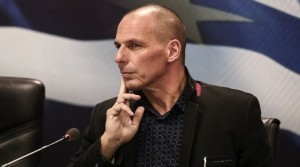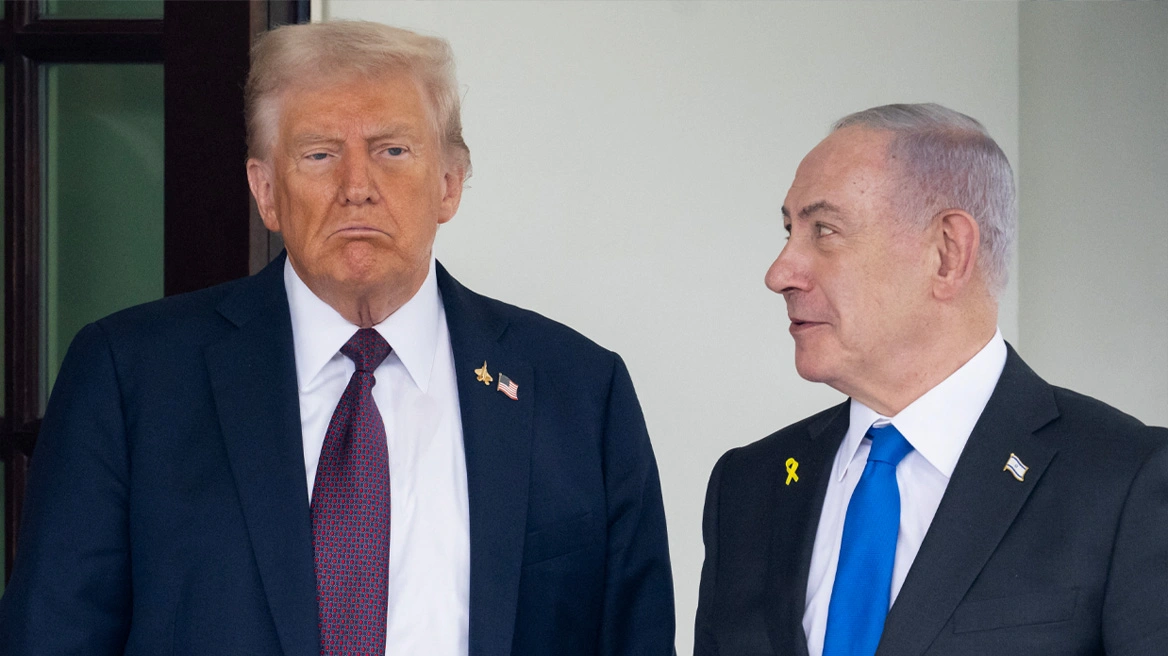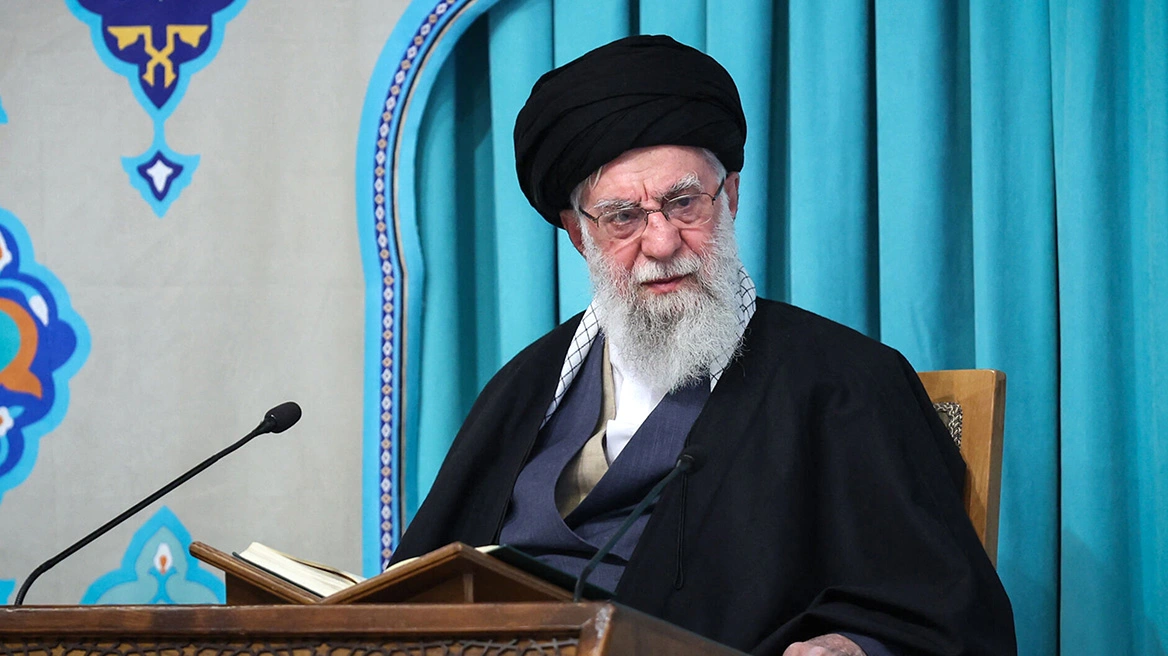In his first major interviews since stepping down as Greece’s FinMin, Yanis Varoufakis reveals that he recommended the imposition of a parallel current and a ‘haircut’ of ECB bonds.
In an interview published by the NewStatesman, and given to Harry Lambert by phone, the self-described “erratic Marxist” said his proposal, however, was not met by support from Greek PM Alexis Tsipras or the inner Cabinet.
Moreover, he also was quoted as saying that Grexit was an option from the first day.
On his part, this is how Reuters’ Hugo Dixon, a leading Varoufakis critic, viewed the interview:

Here’s the interview, in full:
In his first interview since resigning, Greece’s former Finance Minister says the Eurogroup is “completely and utterly” controlled by Germany, Greece was “set up” and last week’s referendum was wasted.
Greece has finally reached an agreement with its creditors. The specifics have not yet been published, but it is clear that the deal signed is more punitive and demanding than the one that its government has spent the past five months desperately trying to resist.
The accord follows 48 hours in which Germany demanded control of Greece’s finances or its withdrawal from the euro. Many observers across Europe were stunned by the move. Yanis Varoufakis was not. When I spoke with Greece’s former finance minister last week, I asked him whether any deal struck in the days ahead would be good for his country.
“If anything it will be worse,” he said. “I trust and hope that our government will insist on debt restructuring, but I can’t see how the German finance minister [Wolfgang Schäuble] is ever going to sign up to this. If he does, it will be a miracle.”
It’s a miracle the Greek people are likely to be waiting for a long time for. On Friday night, when Greece’s parliament agreed to an austerity programme that voters had overwhelmingly rejected in a referendum five days earlier, a deal seemed imminent. A partial write-off of its debt owed to the so-called “Troika” – the IMF, the European Central bank and the European Commission – was unlikely but possible. Now, despite its government’s capitulation, Greece has no debt relief and may yet be thrown out of the Eurozone.
Varoufakis, who resigned a week ago, has been criticised for not signing an agreement sooner, but he said the deal that Greece was offered was not made in good faith – or even one that the Troika wanted completed. In an hour-long telephone interview with the New Statesman, he called the creditors’ proposals – those agreed to by the Athens government on Friday night, which now seem somehow generous – “absolutely impossible, totally non-viable and toxic …[they were] the kind of proposals you present to another side when you don’t want an agreement.”
Varoufakis added: “This country must stop extending and pretending, we must stop taking on new loans pretending that we’ve solved the problem, when we haven’t; when we have made our debt even less sustainable on condition of further austerity that even further shrinks the economy; and shifts the burden further onto the have-nots, creating a humanitarian crisis.”
In Varoufakis’s account, the Troika never genuinely negotiated during his five months as finance minister. He argued that Alexis Tsipras’s Syriza government was elected to renegotiate an austerity programme that had clearly failed; over the past five years it has put a quarter of Greeks out of work, and created the worst depression anywhere in the developed world since the 1930s. But he thinks that Greece’s creditors simply led him on.
A short-term deal could, Varoufakis said, have been struck soon after Syriza came to power in late January. “Three or four reforms” could have been agreed, and restrictions on liquidity eased by the ECB in return.
Instead, “The other side insisted on a ‘comprehensive agreement’, which meant they wanted to talk about everything. My interpretation is that when you want to talk about everything, you don’t want to talk about anything.” But a comprehensive agreement was impossible. “There were absolutely no [new] positions put forward on anything by them.”
Varoufakis said that Schäuble, Germany’s finance minister and the architect of the deals Greece signed in 2010 and 2012, was “consistent throughout”. “His view was ‘I’m not discussing the programme – this was accepted by the previous [Greek] government and we can’t possibly allow an election to change anything.
“So at that point I said ‘Well perhaps we should simply not hold elections anymore for indebted countries’, and there was no answer. The only interpretation I can give [of their view] is, ‘Yes, that would be a good idea, but it would be difficult. So you either sign on the dotted line or you are out.’”
It is well known that Varoufakis was taken off Greece’s negotiating team shortly after Syriza took office; he was still in charge of the country’s finances but no longer in the room. It’s long been unclear why. In April, he said vaguely that it was because “I try and talk economics in the Eurogroup” – the club of 19 finance ministers whose countries use the Euro – “which nobody does.” I asked him what happened when he did.
“It’s not that it didn’t go down well – there was point blank refusal to engage in economic arguments. Point blank. You put forward an argument that you’ve really worked on, to make sure it’s logically coherent, and you’re just faced with blank stares. It is as if you haven’t spoken. What you say is independent of what they say. You might as well have sung the Swedish national anthem – you’d have got the same reply.”
This weekend divisions surfaced within the Eurogroup, with countries split between those who seemed to want a “Grexit” and those demanding a deal. But Varoufakis said they were always been united in one respect: their refusal to renegotiate.
“There were people who were sympathetic at a personal level, behind closed doors, especially from the IMF.” He confirmed that he was referring to Christine Lagarde, the IMF director. “But then inside the Eurogroup [there were] a few kind words and that was it: back behind the parapet of the official version. … Very powerful figures look at you in the eye and say ‘You’re right in what you’re saying, but we’re going to crunch you anyway’.”
Varoufakis was reluctant to name individuals, but added that the governments that might have been expected to be the most sympathetic towards Greece were actually their “most energetic enemies”. He said that the “greatest nightmare” of those with large debts – the governments of countries like Portugal, Spain, Italy and Ireland – “was our success”. “Were we to succeed in negotiating a better deal, that would obliterate them politically: they would have to answer to their own people why they didn’t negotiate like we were doing.”
He suggested that Greece’s creditors had a strategy to keep his government busy and hopeful of a compromise, but in reality they were slowly suffering and eventually desperate.
“They would say we need all your data on the fiscal path on which Greek finds itself, all the data on state-owned enterprises. So we spent a lot of time trying to provide them with it and answering questionnaires and having countless meetings.
“So that would be the first phase. The second phase was they’d ask us what we intended to do on VAT. They would then reject our proposal but wouldn’t come up with a proposal of their own. And then, before we would get a chance to agree on VAT, they would shift to another issue, like privatisation. They would ask what we want to do about privatisation: we put something forward, they would reject it. Then they’d move onto another topic, like pensions, from there to product markets, from there to labour relations. … It was like a cat chasing its own tail.”
His conclusion was succinct. “We were set up.”
And he was adamant about who is responsible. I asked whether German attitudes control the outlook of the Eurogroup. Varoufakis went further. “Oh completely and utterly. Not attitudes – the finance minister of Germany. It is all like a very well-tuned orchestra and he is the director.
“Only the French minister [Michel Sapin] made noises that were different from the German line, and those noises were very subtle. You could sense he had to use very judicious language, to be seen not to oppose. And in the final analysis, when Dr Schäuble responded and effectively determined the official line, the French minister would always fold.”
If Schäuble was the unrelenting enforcer, the German chancellor Angela Merkel presented a different face. While Varoufakis never dealt with her, he said, “From my understanding, she was very different. She tried to placate the Prime Minister [Tsipras] – she said ‘We’ll find a solution, don’t worry about it, I won’t let anything awful happen, just do your homework and work with the institutions, work with the Troika; there can be no dead end here.’”
The divide seems to have been brief, and perhaps even deliberate. Varoufakis thinks that Merkel and Schäuble’s control over the Eurogroup is absolute, and that the group itself is beyond the law.
Days before Varoufakis’s resignation on 6 July, when Tsipras called the referendum on the Eurogroup’s belated and effectively unchanged offer, the Eurogroup issued a communiqué without Greek consent. This was against Eurozone convention. The move was quietly criticised by some in the press before being overshadowed by the build-up to the referendum, but Varoufakis considered it pivotal.
WhenJeroen Dijsselbloem, the European Council President, tried to issue the communiqué without him, Varoufakis consulted Eurogroup clerks – could Dijsselbloem exclude a member state? The meeting was briefly halted. After a handful of calls, a lawyer turned to him and said, “Well, the Eurogroup does not exist in law, there is no treaty which has convened this group.”
“So,” Varoufakis said, “What we have is a non-existent group that has the greatest power to determine the lives of Europeans. It’s not answerable to anyone, given it doesn’t exist in law; no minutes are kept; and it’s confidential. No citizen ever knows what is said within . . . These are decisions of almost life and death, and no member has to answer to anybody.”
Events this weekend seem to support Varoufakis’ account. On Saturday evening, a memo leaked that showed Germany was suggesting Greece should take a “timeout” from the Eurozone. By the end of the day, Schäuble’s recommendation was the conclusion of the Eurogroup’s statement. It’s unclear how that happened; the body operates in secret. While Greeks hung on reports of their fate this weekend, no minutes were released from any meetings.
The referendum of 5 July has also been rapidly forgotten. It was preemptively dismissed by the Eurozone, and many people saw it as a farce – a sideshow that offered a false choice and created false hope, and was only going to ruin Tsipras when he later signed the deal he was campaigning against. As Schäuble supposedly said, elections cannot be allowed to change anything. But Varoufakis believes that it could have changed everything. On the night of the referendum he had a plan, Tsipras just never quite agreed to it.
The Eurozone can dictate terms to Greece because it is no longer fearful of a Grexit. It is convinced that its banks are now protected if Greek banks default. But Varoufakis thought that he still had some leverage: once the ECB forced Greece’s banks to close, he could act unilaterally.
He said he spent the past month warning the Greek cabinet that the ECB would close Greece’s banks to force a deal. When they did, he was prepared to do three things: issue euro-denominated IOUs; apply a “haircut” to the bonds Greek issued to the ECB in 2012, reducing Greece’s debt; and seize control of the Bank of Greece from the ECB.
None of the moves would constitute a Grexit but they would have threatened it. Varoufakis was confident that Greece could not be expelled by the Eurogroup; there is no legal provision for such a move. But only by making Grexit possible could Greece win a better deal. And Varoufakis thought the referendum offered Syriza the mandate they needed to strike with such bold moves – or at least to announce them.
He hinted at this plan on the eve of the referendum, and reports later suggested this was what cost him his job. He offered a clearer explanation.
As the crowds were celebrating on Sunday night in Syntagma Square, Syriza’s six-strong inner cabinet held a critical vote. By four votes to two, Varoufakis failed to win support for his plan, and couldn’t convince Tsipras. He had wanted to enact his “triptych” of measures earlier in the week, when the ECB first forced Greek banks to shut. Sunday night was his final attempt. When he lost his departure was inevitable.
“That very night the government decided that the will of the people, this resounding ‘No’, should not be what energised the energetic approach [his plan]. Instead it should lead to major concessions to the other side: the meeting of the council of political leaders, with our Prime Minister accepting the premise that whatever happens, whatever the other side does, we will never respond in any way that challenges them. And essentially that means folding. … You cease to negotiate.”
Varoufakis’s resignation brought an end to a four-and-a-half year partnership with Tsipras, a man he met for the first time in late 2010. An aide to Tsipras had sought him out after his criticisms of George Papandreou’s government, which accepted the first Troika bailout in 2010.
“He [Tsipras] wasn’t clear back then what his views were, on the drachma versus the euro, on the causes of the crises, and I had very, well shall I say, ‘set views’ on what was going on. A dialogue begun … I believe that I helped shape his views of what should be done.”
And yet Tsipras diverged from him at the last. He understands why. Varoufakis could not guarantee that a Grexit would work. After Syriza took power in January, a small team had, “in theory, on paper,” been thinking through how it might. But he said that, “I’m not sure we would manage it, because managing the collapse of a monetary union takes a great deal of expertise, and I’m not sure we have it here in Greece without the help of outsiders.” More years of austerity lie ahead, but he knows Tsipras has an obligation to “not let this country become a failed state”.
Their relationship remains “extremely amicable”, he said, although when we spoke on Thursday, they hadn’t talked all week.
Despite failing to strike a new deal, Varoufakis does not seem disappointed. He told me he is “on top of the world.”
“I no longer have to live through this hectic timetable,” he said, “which was absolutely inhuman, just unbelievable. I was on two hours sleep every day for five months. … I’m also relieved I don’t have to sustain any longer this incredible pressure to negotiate for a position I find difficult to defend.”
His relief is unsurprising. Varoufakis was appointed to negotiate with a Europe that didn’t want to talk, no longer feared a “Grexit” and effectively controlled the Greek treasury’s bank accounts. Many commentators think he was foolish, and the local and foreign journalists I met last week in Athens spoke of him as if he was a criminal. Some people will never forgive him for strangling a nascent recovery by reopening negotiations. And others will blame him for whichever harsh fate awaits Greece this week.
But Varoufakis seemed unconcerned. Throughout our conversation he never raised his voice. He came across as imperturbably calm, and often chuckled. His conservation wasn’t tinged with regret; he appears to be treating the loss of power as ambivalently as he treated its acquisition.
Now he will remain an MP and continue to play a role in Syriza. He will also return to a half-finished book on the crisis, mull the new offers publishers have already begun to send him, and may return to the University of Athens in some capacity after two years teaching in Texas.
By resigning and not signing a deal he abhorred, he has kept both his conscience free and his reputation intact. His country remains locked in a trap he spent years opposing and months fighting, but he has escaped.
With print media fulfilled, he turned to broadcast media, speaking to Australian broadcaster ABC radio and Alex McClintock.
The interview:
‘This is the politics of humiliation,’ he told Late Night Live. ‘The troika have made sure that they will make him eat every single word that he uttered in criticism of the troika over the last five years. Not just these six months we’ve been in government, but in the years prior to that.
‘This has nothing to do with economics. It has nothing to do with putting Greece on the way to recovery. This is a new Versailles Treaty that is haunting Europe again, and the prime minister knows it. He knows that he’s damned if he does and he’s damned if he doesn’t.’
The deal, agreed to on Monday after 17 hours of talks with eurozone leaders, contains tough conditions including pension cuts, tax increases and the movement of public assets into a trust fund to pay for the recapitalisation of Greek banks.
Mr Varoufakis rejected the deal in the strongest possible terms, comparing it to the 1967 coup d’état that installed a military dictatorship in the Mediterranean nation.
‘In the coup d’état the choice of weapon used in order to bring down democracy then was the tanks. Well, this time it was the banks. The banks were used by foreign powers to take over the government. The difference is that this time they’re taking over all public property.’
Mr Varoufakis suggested that Mr Tsipras may call a snap election rather than bring the deal before the Greek parliament, saying he would be ‘very surprised’ if Mr Tsipras wanted to stay on as prime minister.
He insisted, however, that he and Mr Tsipras remain on good terms, and that he has kept a low profile over the last week in order to support Mr Tsipras and his successor in the finance ministry, Euclid Tsakolotos.
‘I jumped more than I was pushed,’ said Mr Varoufakis, describing his resignation in the immediate aftermath of the ‘no’ vote in the July 6 referendum on bailout terms similar to those accepted on Monday.
‘I entered the prime minister’s office elated. I was travelling on a beautiful cloud pushed by beautiful winds of the public’s enthusiasm for the victory of Greek democracy in the referendum. The moment I entered the prime ministerial office, I sensed immediately a certain sense of resignation—a negatively charged atmosphere. I was confronted with an air of defeat, which was completely at odds with what was happening outside.
‘At that point I had to put it to the prime minister: “If you want to use the buzz of democracy outside the gates of this building, you can count on me. But if on the other hand you feel like you cannot manage this majestic ‘no’ to an irrational proposition from our European partners, I am going to simply steal into the night.”’
The former finance minister also described the Greek government’s secret preparations to print drachmas in the event of the country being forced to leave the euro.
‘As a responsible government, knowing full well that there was a very significant alliance within the eurogroup whose purpose was to throw us out of the euro, we had to make contingencies,’ he said. ‘We had to have a small team of people in secret who would create the plan in case we were forced to exit the monetary union known as the eurozone.’
‘Of course, there is a conundrum here. Once this plan begins to be implemented, once you go from five people working on it to 500—which is the minimum you need to implement it—it becomes public knowledge. The moment it becomes public knowledge, the power of prophecy creates a dynamic of its own … We never made that transition from five to 500. We never felt we had a mandate to do it. We never planned to do it. We had the design on paper but it was never activated.’
Mr Varoufakis said that he will remain as a backbencher in the Greek parliament, where he has ‘a lot more room to manoeuvre and speak the truth’. He warned however, that austerity will further embolden the country’s far right.
‘In parliament I have to sit looking at the right hand side of the auditorium, where 10 Nazis sit, representing Golden Dawn. If our party, Syriza, that has cultivated so much hope in Greece … if we betray this hope and bow our heads to this new form of postmodern occupation, then I cannot see any other possible outcome than the further strengthening of Golden Dawn. They will inherit the mantle of the anti-austerity drive, tragically.
‘The project of a European democracy, of a united European democratic union, has just suffered a major catastrophe.’
Ask me anything
Explore related questions






